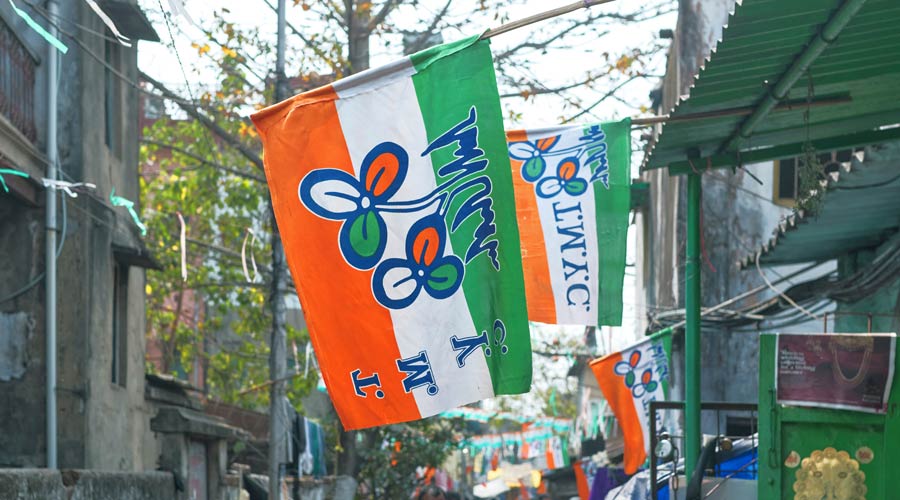Amid reports that Maoists were trying to regroup in Junglemahal area of West Bengal, their former stronghold, with posters having resurfaced in some pockets, political parties in the state have taken to blame game, maintaining that fears were being unnecessary fuelled by rival camps for individual gains.
The Centre had warned of Maoist activities in Bengal earlier in the week, with the state police having tightened its vigil in Junglemahal comprising parts of East and West Midnapore, Jhargram, Bankura and Purulia districts.
"Security forces have been put on high alert. We are keeping a close watch on the situation," a senior police officer said.
Chief Minister Mamata Banerjee, however, alleged earlier in the week that the posters were put up by BJP workers, and that a few television channels were creating "an atmosphere of fear" by giving the matter "unnecessary" coverage.
In the same breath, she also said that at least five Maoists had entered the state from neighbouring Jharkhand in the recent past.
Echoing her, TMC West Midnapore district president and MLA Ajit Maity said that it was a ploy by opposition parties to create a "fear psychosis".
"The situation in Junglemahal is no longer conducive for Maoists activities as underdevelopment, which was the real issue of concern, has been resolved," he told PTI.
Maoist activities ebbed in the state after 'Operation Green Hunt' was launched in 2009 with central and state forces jointly mounting attacks on the Left-wing rebels.
Kishenji, a CPI (Maoist) politburo member leading the rebel activities, was killed during a gun fire exchange with security personnel on November 24, 2011.
Rebuffing his allegation, BJP's West Midnapore district president Tapas Mishra said it was a hoax generated on purpose to stop the opposition from carrying out work there.
He also said that there was no such concrete information that pointed towards the resurgence of ultra-wing extremism in the area.
"We think this entire episode is a hoax to stop the opposition from carrying out their activities in the area. This could also be the fallout of infighting in the local TMC camp," he said.
CPI(M) West Midnapore district secretary Sushanta Ghosh, who had been at the forefront of tackling ultra-left terror in Junglemahal from 2008-2011, too, dismissed the speculation as a "cleverly crafted" tactic to stop democratic activities in the area.
"We have seen how the state administration was sitting idle to ensure that this Maoist strike call is a success. Usually, the administration goes overboard to foil a strike call by opposition parties. I have no information about any Maoist activity. Those who were then Maoists or members of PCAPA have either joined the TMC or are supporters of the ruling party," he told PTI.
According to sources in the three parties, mass outreach initiatives were being scaled up in the zone to foil attempts to breed insurgency, if any.
Prasun Chatterjee, a Kolkata-based political activist who was arrested for alleged links with the CPI(Maoist) in 2009 and later acquitted, also said that it was best not to speculate.
"Is there anyone left to lead such a movement? I don't think so as most of them have joined mainstream political parties. It isn't wise to speculate," Prasun Chatterjee said.
The state, which was the cradle of the Naxalite movement in the late sixties, had witnessed a spurt in Maoist violence towards the end of 2008, following an attack on the then Chief Minister Buddhadeb Bhattacharya's convoy in Salboni area of West Midnapore district.
It prompted a police crackdown, following which Maoist-backed People's Committee against Police Atrocities (PCAPA) was formed in the area.
Bloodbath and killings became a regular affair in the area shortly after, with over 350 deaths recorded between 2009 and 2011.
The TMC government's ability to reign in Maoist movement post 2011 is mostly credited to its developmental schemes for the people of the poverty-stricken region, including the availability of rice at Rs 2 per kg for every household.
Nevertheless, former West Bengal DGP Bhupinder Singh Hooda, who was the state police chief at the height of Maoist movement, issued a word of caution, underscoring that insurgent movements go through a cycle.
"All insurgent movements, including ultra-left extremism, go through highs and lows. It is better to remain vigilant than getting caught off guard," he added.
PTI












